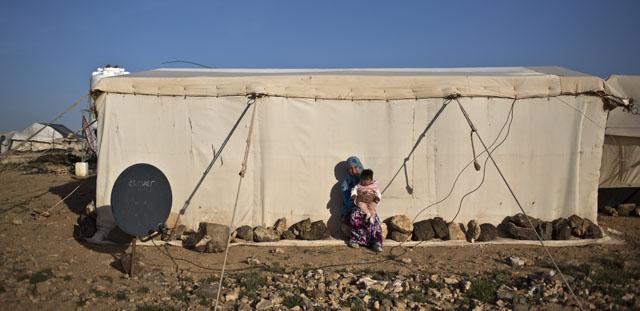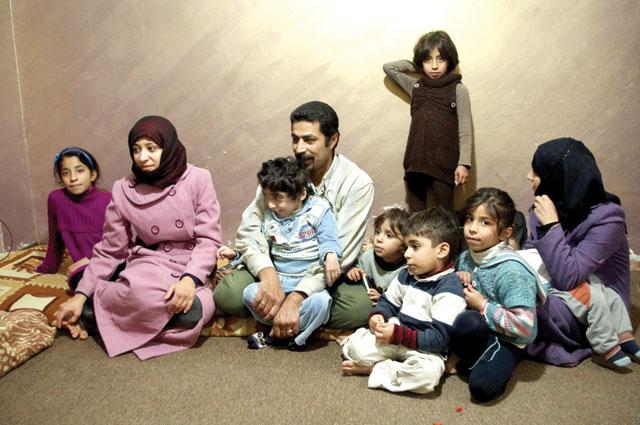You are here
WFP assistance enabling Syrian-Jordanian families to make a life in Amman
By Lara Darwazah - Oct 02,2016 - Last updated at Oct 02,2016

Nadia prepares musakhan at her Amman home recently (Photo courtesy of WFP/Lara Darwazah)
AMMAN — As WFP beneficiaries, Jordanian Nadia and her Syrian husband Fadel have been receiving JD140 a month through their voucher usage for their six-member family, from various UN bodies and have found this help to be indispensable.
“As a cook and a mother I also have to manage my home. Circumstances are tough, we have bills and rent to pay, and these obligations take away from the pleasure of food and cooking,” Nadia explains.
“With this regular allowance allocated to food, we are in a better situation to feed our children a more varied and wholesome diet,” she says.
Since the late 2000s the WFP food assistance system started giving families choices in what they could purchase. These cash-based transfers involved bank notes, vouchers and electronic cards to beneficiaries in order to spend directly.
One by one, Nadia’s five children walk out of their bedroom after their morning nap to greet the reporter visiting on this summer morning.
Nadia continues to give examples on how her situation has changed.
“My larder is stocked well now, whereas before we could merely scrape by. Nowadays I can afford to get extra things for the children, and I am in fact able to manage my household expenditure better as a result.”
Inside Nadia’s well-kept kitchen, she starts stacking onions, sumac and an olive oil mixture onto taboun bread. She is preparing the Palestinian dish musakhan for lunch.
As a final step, she embellishes the grilled chicken pieces and drenched bread with nuts. These nuts are a good example of a luxury her family could not afford to have before.
Fish is another item she enjoys buying with her electronic card to cook for her children.
The card/voucher system started in 2013 in both the Zaatari Refugee Camp and in the northern governorates of the Kingdom.
It seeks to give the refugees more autonomy and control over the food they buy. Each family owns a card that is credited with JD20 or JD10 per month, depending on the family’s level of vulnerability.
Nadia and Fadel met in Al Kiswah city in Syria in 1998. While visiting the neighbouring country, she was persuaded by her mom’s relatives to settle in Syria.
Nadia obtained a secretarial job in a sackcloth factory to help her father financially and met her future husband while working there.
The two tied the knot in 2000 and later returned to live and work in Amman where they have settled ever since.
Asked about her aspirations for her family, Nadia explains that despite her children being born here and despite her being Jordanian, legal procedures and paperwork are proving to be a big struggle for them.
“For example, getting any legal papers done would require Fadel’s passport renewal. The cost for that amounts to $500 including medical costs.”
Another struggle is being unable to obtain a driver’s licence for him as a Syrian national, which she says would help bring another source of income to the family.
Despite these challenges Nadia insists she will not give up. She is keen to instill a sense of belonging in her children, always reminding them that they are rooted in Jordan, which will always remain their home.
She feels she is grateful for the help her children receive from the government, such as exemptions from tuition fees and cost of books.
Nadia also mentions the official cards that her children are issued now, identifying them as children of a Jordanian mother.
This will enable them to get the university education and driver’s licences she hopes their father can get one day.
The writer is an education specialist who also blogs about culture and food (www.alifeonaplate.com). She has partnered with WFP to write a series of articles that explores the lives of vulnerable Jordanians and Syrian refugees through their food. The articles will be published in The Jordan Times biweekly.
Related Articles
The UN World Food Programme (WFP) has announced that its food assistance for Syrian refugees living in Jordanian communities will be prioritised further to make sure support goes to those most in need.
Ali Marhabji, his wife and eight children are one of the thousands of Syrian families affected by last week’s decision by the World Food Programme (WFP) to suspend a critical food voucher scheme, citing lack of funding.
AMMAN — A reduction in resources and financial aid for the UN World Food Programme (WFP) regarding Syrian refugees in Jordan has meant worse














